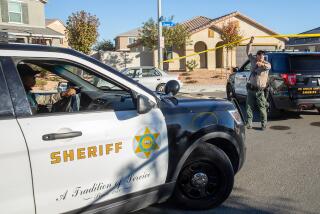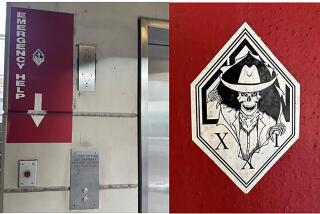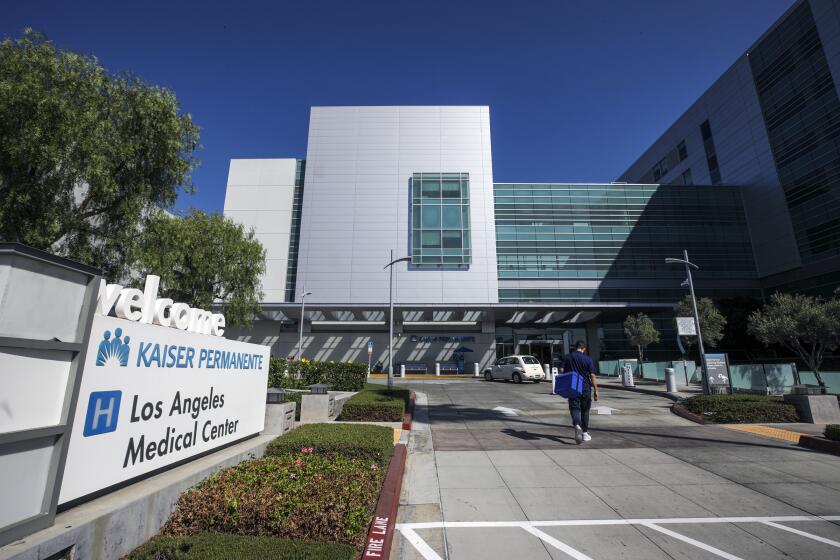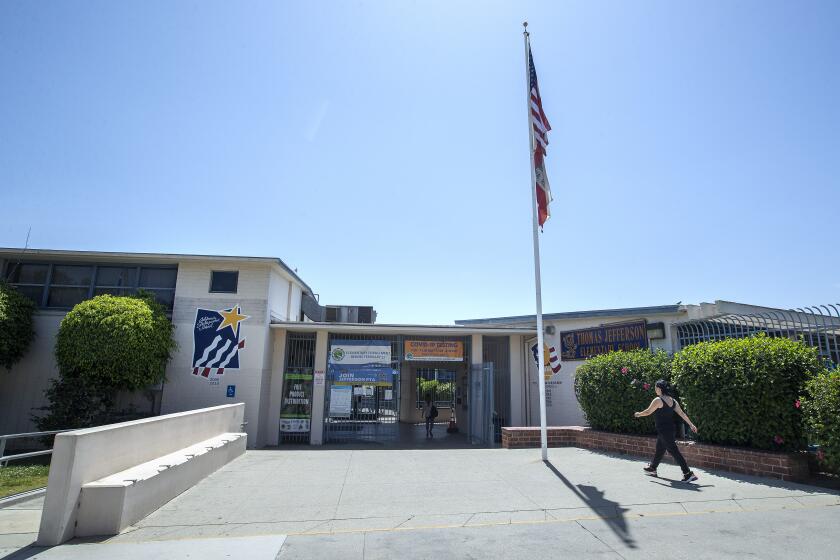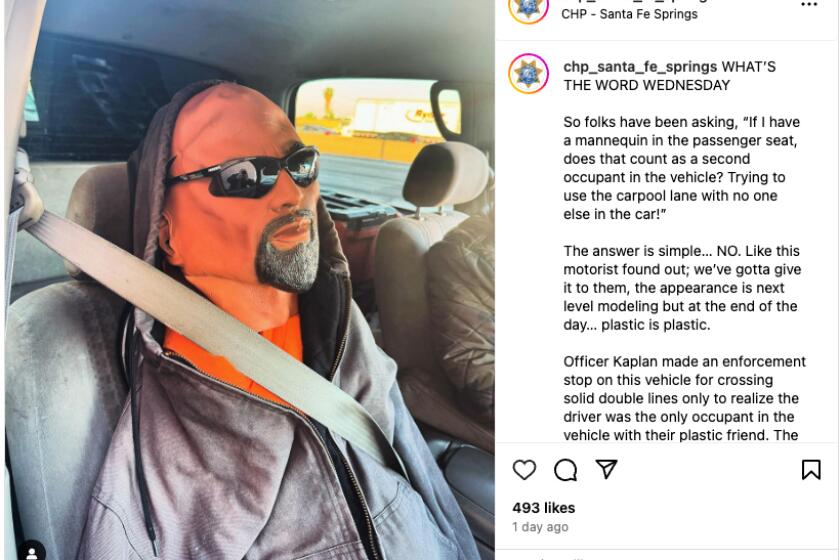L.A. County deputies claim abuse by an East L.A. sheriff’s station ‘gang’

L.A. Times Today airs on Spectrum News 1, Monday-Friday at 7 p.m. and 10 p.m.
Late one night last September, a party for Los Angeles County sheriff’s deputies was winding down.
New deputies working in East L.A. were celebrating having successfully completed a probation period and their status as full-fledged members of the Sheriff’s Department.
But the gathering took an ominous turn for some when several older deputies showed up.
According to legal claims filed against the county Thursday by seven deputies, the men belonged to the Banditos, a clique of predominantly Latino deputies who wear tattoos of a skeleton with a sombrero, bandolier and pistol and are alleged to routinely harass young Latino officers at the station.
The claims, which serve as precursors to lawsuits, demand tens of millions of dollars from the county for failing to address the hostile work environment the Banditos are alleged to have created.
The party ended in violence when the Banditos attacked several of the new deputies, according to the claims. One rookie said he was thrown to the ground and punched in the face before being knocked unconscious. Another recalled being choked to the point of passing out.
“This is not just a case about beating up a handful of cops — it’s about fear through intimidation to maintain the corrupt status quo and make certain the new idealistic cops don’t talk,” said Vincent Miller, an attorney representing the seven deputies who filed the claims. “This has been going on for years, and the county needs to fix it.”
The Sheriff’s Department issued a statement Thursday that said it would not tolerate any form of hazing or harassment within the organization.
“The allegations outlined in this recent claim arose prior to Sheriff [Alex] Villanueva assuming office. The allegations are being fully investigated and appropriate actions were properly commenced by the prior administration,” the statement said. “Sheriff Villanueva had the Unit Commander replaced, in addition to key supervisory personnel. The new Unit Commander has met with staff members, and has made it abundantly clear that activities which violate workplace policies or the law will be immediately addressed with swift and appropriate action.”
Ron Hernandez, president of the Assn. for Los Angeles Deputy Sheriffs, the union that represents rank-and-file deputies, said the group would withhold specific comment out of respect for the ongoing investigation.
“ALADS fully supports a detailed, fair, timely investigation, with an interest in due process for all parties said to be involved,” Hernandez said.
The allegations are the latest for a department that has struggled for years to address numerous examples of secretive, gang-like deputy societies accused of committing abuses against inmates, fellow deputies and while on patrol.
In July last year, then-Sheriff Jim McDonnell launched what he said would be a comprehensive study of deputy cliques after The Times revealed that a Compton station deputy involved in the fatal shooting of a black man had testified that he and as many as 20 of his colleagues had matching skull tattoos.
That inquiry went unfinished when Villanueva, a former lieutenant in the department, unseated McDonnell and took office in early December. Villanueva, who has drawn fire from critics who worry he is rolling back reforms meant to curb abuse by deputies, has at times defended deputies with station tattoos, saying they’re honorable people. But he has criticized previous administrations for allowing a broader culture of hazing to fester in the department.
In comments shortly after taking office, he blamed station captains and other top officials for failing to stop a work culture of “unchecked hazing” that allowed cliques to form and grow.
Some deputies have defended the tattoos they share with others in their station as a source of benign camaraderie and a way to boost morale. Some have also said they have a free-speech right to wear them.
Although accounts of similar officer groups have surfaced in some other departments around the country, nowhere has the issue been as intractable and garnered as much scrutiny as in the Los Angeles sheriff’s ranks.
A watchdog panel in 1992 pressed the Sheriff’s Department to root out cliques. Two decades later, a blue-ribbon commission sharply criticized the department for turning a blind eye to the problem and allowing the fraternities to use excessive force against people in the county jails and on the streets.
The panel had focused in part on “the 3000” clique, a band of deputies who worked as jailers on the third, or 3000, floor of Men’s Central Jail. Several members of the group were fired after a confrontation with two fellow deputies at an employee Christmas party and after they allegedly punched a female deputy in the face. Sheriff’s officials accused the group of using gang-like three-finger hand signs and said jailers would “earn their ink” by breaking inmates’ bones.
The recent allegations are not the first against the Banditos. In 2014, the county paid a female deputy assigned to the East L.A. station $1.5 million to settle a lawsuit, in which she claimed she had been physically and mentally harassed by some of the clique’s 80 members after refusing to go along with its “traditions and initiation rituals.”
At the time, then-interim Sheriff John Scott announced he would share the results of an investigation into claims of bullying by the Banditos, yet the probe has remained confidential.
In a statement Thursday, Hilda Solis, a member of the Board of Supervisors, said she was “disappointed and dismayed” at the latest allegations.
“I have spoken repeatedly with the L.A. County Sheriff’s Department, the Civilian Oversight Commission, the Office of Inspector General, and county counsel about my deep concern about the potential existence of secret cliques or gangs of sheriff deputies…. The Sheriff’s Department must hold itself out to the highest levels of professionalism and respect for others. The role of sheriff’s deputies is to protect and serve the public, and secret cliques and violent gangs of law enforcement personnel must be eliminated. East L.A. and the greater L.A. County community deserve nothing less.”
The claims filed Thursday were brought by five young Latino deputies involved in the melee at the party and two veteran deputies who say they suffered retaliation after warning station officials about the Banditos.
In one claim, Miller, the deputies’ attorney, portrayed the East L.A station at the time of the fight as a place run by the Banditos “in a similar manner to prisoners running a prison yard.” Leaders enjoyed close ties with an influential sergeant, Patty Estrada, who Miller said was known by the nickname “Pink Hand” — a reference to the Black Hand tattoo worn by members of the notorious Mexican Mafia prison gang. Estrada allegedly persuaded the station’s captain to take a stance of “willful blindness” to the group, according to the claims.
Estrada could not be reached for comment.
Particular targets were young Latino deputies who resisted demands that they make questionable arrests to meet unofficial productivity quotas and work overtime without pay, the claims allege.
Friction in the station increased in spring and summer last year when training officers Benjamin Zaredini and Louis Granados went to a sympathetic lieutenant with their concerns about the sway the Banditos held over the station, Miller said in the claims.
The lieutenant investigated the allegations but was stonewalled by the captain, and the deputies began experiencing retaliation when word of their whistleblowing efforts got back to Bandito members, Miller alleged. Granados was denied a promotion and Zaredini was demoted, while Banditos refused to provide backup to the deputies on potentially dangerous calls, Miller alleged.
The problems came to a head at the party in the early-morning hours of Sept. 29, when three deputies, David Silverio, Gregory Rodriguez and Rafael Munoz, and Sgt. Mike Hernandez allegedly began harassing a rookie, Deputy Alfred Gonzalez, according to the claims.
The confrontation turned violent when two of the young deputies filing claims, Art Hernandez and Oscar Escobedo, along with others, tried to intervene. Hernandez claimed Munoz punched him repeatedly in the face. In the papers filed with the county, Miller said Escobedo was punched and kicked repeatedly by a group of Banditos before being choked. Other deputies filing claims were also allegedly struck by the Banditos, Miller said.
Hernandez and Escobedo sought medical attention for minor injuries, Miller said.
Following the fight, the three deputies and sergeant were placed on paid administrative leave as part of an internal investigation into the incident, a sheriff’s spokeswoman said at the time. The men could not be reached for comment, and a spokeswoman for the department did not respond to questions about their current work status.
Miller said his clients had been interviewed as well by investigators from a sheriff’s unit that investigates possible criminal activity by deputies.
The captain was ultimately transferred from the station, and his replacement removed supervisors thought to be close with the clique, Miller said.
Despite the change in leadership, problems have persisted, Miller claimed.
“The culture is still there,” he said. “When people get used to a culture, they begin to think it’s normal — they grow accustomed to it. There isn’t a legitimate law enforcement presence in East Los Angeles. It’s a gang.”
Times staff writer Maya Lau contributed to this report.
Follow @joelrubin on Twitter
More to Read
Start your day right
Sign up for Essential California for news, features and recommendations from the L.A. Times and beyond in your inbox six days a week.
You may occasionally receive promotional content from the Los Angeles Times.
